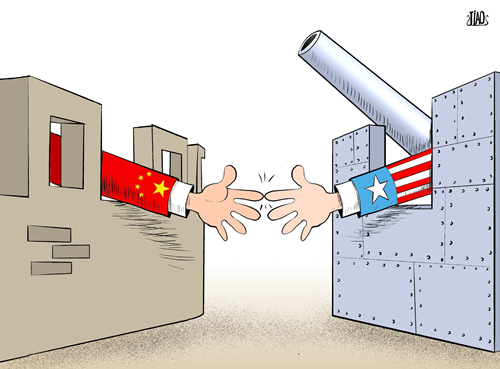The US in the eyes of China in 2012
- By Shen Dingli
 0 Comment(s)
0 Comment(s) Print
Print E-mail China.org.cn, February 7, 2012
E-mail China.org.cn, February 7, 2012
 |
|
Military cooperation [China.org.cn] |
In the year 2012, China views the United States much the same as other countries do – one that is facing four major challenges.
First, in the era of globalization, financial powers in the U.S. and other Western countries are restructuring the manufacturing industry all over the world. But this has brought challenges to their domestic manufacturing sectors, which results irreversible job losses in those countries and widening gap between the rich and the poor.
Second, the lifestyle and consumer habit of people in the U.S. have for a long time advanced from the country's stock of fortune and prosperity, making its government accustomed to fiscal deficits and growing national debt. This has seriously affected the health of the U.S. economy and its political impact on the world.
Third, because of political friction, it's hard for the U.S. government to reach a consensus on fiscal balance. Under the pressure of electoral politics, the two U.S. political parties can neither reach agreement on tax increases, nor achieve any compromise about reducing expenditure.
Forth, although the periodic external expansion of the U.S. has reached a period of contraction, America finds it hard to accept that its global influence is relatively declining, owing to its political genes and interest demands. The U.S. is reluctant to give up seeking the world's leadership role even though it is facing various troubles, and this will continue to deplete the country’s strength and speed up the changing hierarchy of global powers.
Some of these four challenges are common among Western countries. However, the U.S. faces some unique challenges, such as its ultra-high spending. The long-term overdraft has depleted the country's treasury for a long time, and that is due to the orientation of seeking global leadership.
During the Cold War, the world was polarized into two camps, the interests of the U.S. linked tightly with its allies. Nowadays, it faces a much more complex web of international relations unavoidable in the era of globalization.
As developing countries opened their labor markets, China began its economic reform and opening up. In order to seize more profits, U.S. companies and capital rushed into these developing countries. During this initial period, the U.S. government did not forbid the outgoing business opportunities, and instead regulated economic and trade relations with those countries through other means.






Go to Forum >>0 Comment(s)